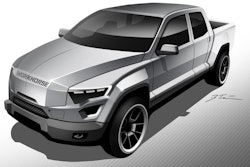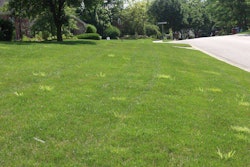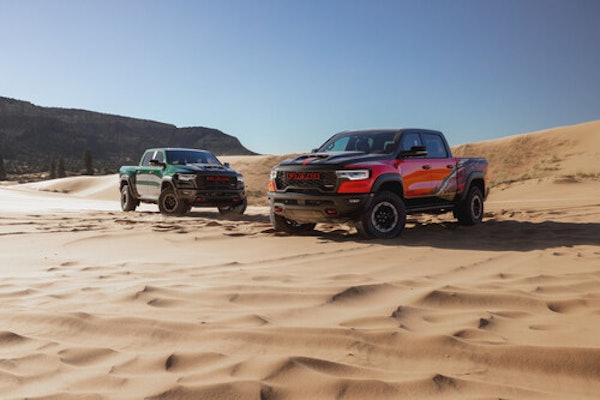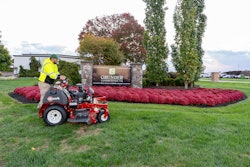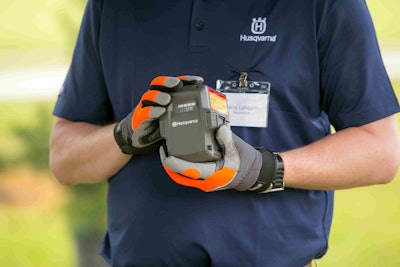 The 40-volt Li-ion battery works in any of Husqvarna’s professional battery series and has a run time that varies from 35 to 50 minutes.
The 40-volt Li-ion battery works in any of Husqvarna’s professional battery series and has a run time that varies from 35 to 50 minutes.Photo: Husqvarna
“If it ain’t broke don’t fix it” could be the motto of those who are resistant to change, but it most certainly is not the motto for Husqvarna.
Even though the company is 328 years old it is still focused on innovation and finding the next best way to meet its customers’ needs. Husqvarna concentrates on three main tiers: productivity, durability, and ergonomics.
Yet a new need has arisen in recent years that the company is striving to meet and that is sustainability. In an attempt to gauge just how important sustainable lawn care is, it conducted a Green Spaces Survey asking 1,579 U.S. consumers about their outdoor power equipment preferences and opinions of professional landscaping companies that use eco-friendly tools.
Of individuals polled, 65 percent stated they would choose a landscaper who uses eco-friendly outdoor power equipment over one who doesn’t. Companies that choose to be eco-friendly are also more likely to receive ongoing customer support, as 72 percent of the survey respondents said they would support eco-friendly companies over those that do not.
Participants of the poll also expressed an interest in quieter outdoor power equipment, with 57 percent saying they would even be willing to pay more for a landscaper who uses quieter equipment.
The answer to these requests for quieter, more sustainable equipment is battery power, but it faces a daunting task.
“It’s a mindset change,” said Pierre Lanquist, global battery product manager for Husqvarna. “They think the noise equals power.”
As anyone who has ever talked politics knows, it is near impossible to change an individual’s mind on a subject. However, the message that Husqvarna is trying to get across is how battery-powered equipment really isn’t that different, it’s just helping landscapers work smarter.
For some landscaping companies, like Sebert Landscape based in Bartlett, Illinois, it is all about serving clients the right way.
“We feel we’re doing something better for the environment,” Jeff Sebert said, CEO of Sebert Landscape.
The company started using battery power five or six years ago. At first overcoming the culture of gas power was difficult, but now crew members are disappointed when they have to use gas-powered equipment. While they were previously accustomed to the loud noise and noxious fumes of the machine, the difference was noticeable and they soon did not want to switch back.
“We truly believe the future of the industry is battery power,” Sebert said.
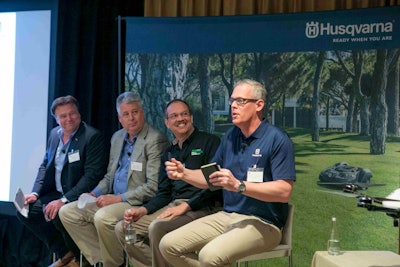 Panelists discussed the challenges that battery-powered equipment currently faces.
Panelists discussed the challenges that battery-powered equipment currently faces.Photo: Husqvarna
While Sebert Landscape has gone the whole nine yards by setting up its trailers with solar panels to power the charging stations, Sebert acknowledges it looks more complicated than it truly is.
During a panel discussion as to why battery-powered equipment has been disregarded, despite its benefits of being lighter, quieter and maintenance-free, there were several theories.
“Small guys are working for profit,” said Scott Lindley, vice president of sales and marketing with the National Association of Landscape Professionals (NALP). “They have to decide are they going to pay their bills or are they going to buy this new equipment?”
It is true battery-powered equipment costs more at the start, but unlike its gas equivalent, it does not need fuel, oil, air filters, spark plugs and so on, making it a more cost-efficient choice in the long run.
One of the other concerns is that dealers don’t have much incentive to promote battery-powered equipment because they lose out their servicing options.
“You’ve got to create a win-win for both the dealer and customer,” said Ralph Egues, executive director of the National Hispanic Landscape Alliance (NHLA).
In the end, the panelists agreed it comes down to education and what the consumer expects.
“When the consumer begins demanding and expecting eco-friendly equipment, companies will have to change,” Lindley said.
Check back later this week for an article about the future of the Automower and my review of Husqvarna’s battery-powered equipment after testing it.

